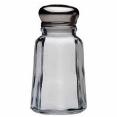
CDC: Americans Consume Too Much Salt
Most Americans consume more than double the amount of their daily recommended level of sodium, according to a new study released by the Centers for Disease Control and Prevention. The study shows that more than two out of three adults are in population groups that should consume no more than 1,500 milligrams (mg) per day of sodium. During 2005-2006 the estimated average intake of sodium for persons in the United States age 2 years and older was 3,436 mg per day.
A diet high in sodium increases the risk of having higher blood pressure, a major cause for heart disease and stroke. These diseases are the first and third leading causes of death in the United States.
"It's important for people to eat less salt. People who adopt a heart healthy eating pattern that includes a diet low in sodium and rich in potassium and calcium can improve their blood pressure," said Darwin R. Labarthe, M.D., Ph.D., director of CDC's Division for Heart Disease and Stroke Prevention. "Reducing sodium intake can prevent or delay increases in blood pressure for everyone."
The study, appearing in CDC's Morbidity and Mortality Weekly Report, used data from the National Health and Nutrition Examination Survey, a survey designed to assess the health and nutritional status of adults and children in the United States.
"People need to know their recommended daily sodium limit and take action to reduce sodium intake," Labarthe said. Most of the sodium we eat comes from packaged, processed and restaurant foods. CDC along with other HHS agencies, including the Food and Drug Administration, will be working with major food manufacturers and chain restaurants to reduce sodium levels in the food supply.
This study is the first to use national data to show that 69.2 percent of the adult population belongs to a specific group that should aim to consume no more than 1,500 mg of sodium per day. This group includes persons with high blood pressure, blacks, or middle-aged and older adults (more than 40 years old). The 2005 Dietary Guidelines for Americans recommend that adults in general should consume less than 2,300 mg (approximately one teaspoon of salt) of sodium per day.
CDC has commissioned an Institute of Medicine study that will outline strategies to reduce sodium consumption to levels recommended by the Dietary Guidelines for Americans. To learn more about the report, visit www.iom.edu/CMS/3788/59128.aspx.